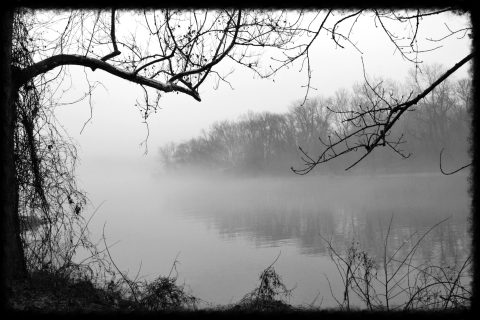I can’t stay away from your piece “Nature.” What really won’t let me go is the way the story nestles something so profoundly strange and beautiful in between mundane images of life. I think most flash that gets weird stays there. What made you decide to bring us back to (and end on) that image of the everyday toil of a worker’s life?
Thank you! Well, your question gets to the heart of what the story is about, I think. We’ve all had those moments of awareness, when time stops and pulls us out of the ordinary. Maybe it happens when we’re in front of a painting, or when we find out someone we love has died and our vision closes in on the spirit and body of that person. But the point is, we’re not allowed to stay there. There are forces, both external and internal, that won’t let us. And the minute we realize that we’re in an altered, authentic space, it’s already over. So I wanted May’s experience to be true to life, in an emotional sense.
This piece is incredibly touching (and somehow both deeply hopeful and deeply sad). A lot of contemporary fiction skirts these sorts of emotions (usually through irony or distance). Is there something about flash fiction (or, perhaps the fantastical) that allows a more intimate exploration of deep emotion than we may feel we can in longer/more traditional forms?
With flash, you just don’t have time to do a lot of set up, and I like the challenge of getting the signposts up quickly. The kind of economy of language the form requires lends itself to depth, in a way that a poem does, because you need to distill what’s most important. I wouldn’t say that it allows a more intimate exploration of emotion than longer forms, though—Elena Ferrante’s Days of Abandonment and Colette’s Duo crushed me for pages and pages. As for the fantastical, flash is ideal for that because the form is so flexible, like a prose poem.
This piece really resonates with current discussions concerning the working class, the working poor, and the death of the dream of the golden years of retirement. For you, is this a piece of our time or is it more connected to eternal, timeless struggles?
I hope it operates on both levels. We live in a society that worships productivity and filling up every minute with something useful. This is the case on factory floors to farms to Amazon warehouses, where employees are treated like machines. When I visited Italy for the first time, a friend told me, “In the States, it’s about doing; here, it’s about being.” That really hit me. I am interested in how we internalize the pressures to produce or even behave mindlessly, like checking our smartphone every three minutes. I would hope that the story would resonate with anyone who has the sublimated pressure that they have no time to think or feel.
You work in fiction, poetry, and nonfiction. Do you have a one, true genre love?
That’s a tough one. My oldest love is fiction, beginning with the day I read Hemingway’s A Sun Also Rises as a teenager. His sentences changed my life. I switched majors and read voraciously, especially Woolf, Kafka, Mann, O’Connor, Fitzgerald, Dostoevsky, Tolstoy, Gogol. I wrote stories of my own, with those stories and novels as my guide. Now that I’m older, I think back with gratitude for how literature changed the course of my life. So fiction is my first love. When I returned to the States after living in Italy, I turned to essays, which I’d been writing all along without thinking about it. Poetry I am very shy about. I have so much to learn, and I am in awe of masters of the form.
Do you have any writing talismans, rituals, or other “quirks” concerning the when, where, or how you sit down and write?
I do. It’s quite simple. When I’m working on a project, I am up at 4:30 or 5, before the kids wake up, and set myself up in the kitchen. I give myself until the coffee is ready to look at e-mail and read the news. Then I can write for about an hour. My kids are still young, so if they wake up early, like they did today, they’ll be here at the table with me. A dream is when I get to the library and write for several consecutive hours, in a windowless room where I can talk out loud and eat snacks.



 The SmokeLong Grand Micro Contest (The Mikey) is now an annual competition celebrating and compensating the best micro fiction and nonfiction online.
The SmokeLong Grand Micro Contest (The Mikey) is now an annual competition celebrating and compensating the best micro fiction and nonfiction online.